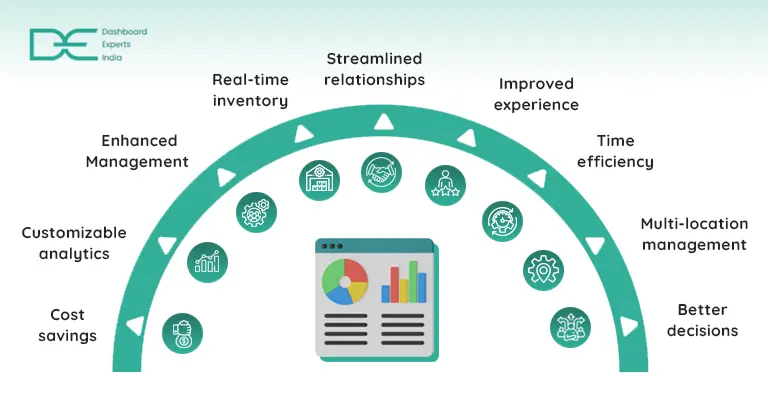A Comprehensive Guide to POS Dashboard for Your Business Success in 2025
Businesses produce millions of data every day. And dashboard being a useful tool helps to make detailed insights. So, the POS or the point-of-sale dashboard offers the best sales rate for the business. And these insights will help to make informed decisions. Moreover, this helps to generate more sales for your business. So, getting the POS dashboard will present you with numerous benefits. If you want to know them, let's dive in.
What is a POS dashboard?
Modern retail processes rely heavily on point-of-sale (POS) dashboards. This dashboard allows firm owners to make well-informed decisions for a real-time snapshot. As a single platform, it helps businesses to keep an eye on and control operations. Such as sales, inventory, worker efficiency, customer behavior, and more. The POS dashboard is a dynamic tool with features to improve decision-making. It expedites processes and fosters expansion. Among the key points that make a POS dashboard useful for real-time sales. And streamline inventory tracking and strong customer relationships.Benefits of using a POS dashboard for your business
Here are some advantages of implementing a POS dashboard for your firm.
Cost savings
The capacity of a POS dashboard development to save businesses money is one of its notable benefits. It guarantees that companies don't overstock by offering real-time data on inventory. While understocking might lead to lost sales opportunities in unnecessary storage costs. A data visualization dashboard maximizes income while cutting down on wasteful spending.Customizable analytics
POS dashboard apps with customizable reporting allow users to create reports and analyses. This helps firms identify patterns, trends, and areas in need of development. As, you can monitor user behavior, determine the best products, and assess performance. Data-driven decisions can promote expansion and effectiveness with such insights.Enhanced management
A POS system dashboard makes personnel management easy. Businesses can find out where employees need assistance collecting performance. Such as measures, establishing goals, and focusing on progress. It increases productivity and cultivates a culture of continual improvement.Real-time inventory
Businesses may keep an eye on sales success and inventory levels using real-time tools. By doing this, stockout scenarios are avoided and guarantee timely stock replenishment. You can get a dashboard development company for more assistance. Firms can keep ahead of client demand by identifying fast-moving products. And modifying the inventory levels accordingly.Streamlined relationships
One effective CRM tool is a POS dashboard. Businesses may create focused efforts, individualized deals, and overall experience. And that too by monitoring the purchasing patterns and behaviors of their users. This promotes loyalty in addition to raising client happiness.Improved experience
Understanding client preferences and trends is critical to providing excellent experiences. A dashboard POS provides firms with the knowledge to adapt their offers. Even it ensures that clients feel valued and cared for.Time efficiency
Businesses save considerable time by automating activities like inventory & sales management. Employees can focus their efforts on strategic activities. And the chance of human error is significantly minimized with intelligent dashboards.Multi-location management
For organizations with several locations, a POS dashboard offers excellent convenience. It delivers real-time sales and inventory data for each site, for centralized management. Businesses can discover issues and changes to improve performance.Better decisions
Businesses can improve their efficiency and profitability by evaluating trends and patterns. A POS dashboard reduces guessing and ensures that all decisions are supported by concrete data.Best practices for using a POS dashboard for B2B enterprise
Here are some practical uses of the UPI POS dashboards.Data-driven decisions
The ultimate value of a POS dashboard is its capacity to give actionable information. Use these data to identify new business prospects and accelerate expansion. Data-driven judgments are more dependable and result in better outcomes.Key performance indicators
Before deploying a POS dashboard, it is critical to establish clear goals and KPIs. Monitor the parameters that are most important to your business. Such as sales success, client retention rates, and inventory turnover. This guarantees that you focus on data rather than being crushed by irrelevant facts.Maintain data accuracy
A POS dashboard relies heavily on accurate data. Ensure that all sales and inventory data are recorded on time. Or a marketing dashboard software service for data accuracy and relevance. This ensures that the dashboard accurately represents your business operations.Analyze data regularly
Make a habit of reviewing your retail dashboard's data on a daily basis. Use the insights to make informed decisions to improve operations. Regular analysis ensures that you remain ahead of potential issues. And capitalize on possibilities for growth.Real-world applications of POS dashboards
Here are the real-world use cases of dashboards across the sectors.- Retail: Retailers utilize POS dashboards to analyze sales across numerous stores. You can find best-selling products, and manage inventory more efficiently. This allows them to maintain regular stock levels and increase client satisfaction.
- Restaurants: In the food business, POS dashboards let cafes measure different values. Such as turnover rates, popular menu items, and personnel schedules. This leads to smoother operations and better dining experiences.
- E-commerce: Online firms build interactive dashboards to analyze client buying habits to manage inventory. And helps to generate customized marketing campaigns for user needs. This improves the consumer experience and increases sales.
Conclusion:
A POS dashboard is a perfect strategic tool for organizations. As they are constantly looking for solutions to expand their reach. As, they can streamline operations, improve decisions, and offer real-time information. So, it helps to achieve the desired goal for the firms. Businesses can improve operational efficiency, better decisions, and open growth prospects. Or you can consult a dashboard development company for more assistance.FAQs
1. What is the POS system's typical issue?
Installation problems are one of the main causes of POS downtime. The many points in a point-of-sale system also make installation more difficult, causing challenges with connectivity and interoperability. Even worse, you can have an issue because of shoddy installation, but you won't have the help to resolve it.2. What are the advantages of a POS system?
- Better inventory management.
- Simple invoicing.
- Quick payments.
- Better customer management.
3. Why is point-of-sale data important?
Analyzing POS data assists in identifying trends and patterns, such as seasonal swings, market movements, or changes in consumer behavior. By identifying these trends, firms may adjust to capitalize on new possibilities and remain competitive.4. Which four characteristics make up a point-of-sale system?
Essential POS system characteristics. Processing transactions, streamlining corporate processes, making shopping easier, improving customer satisfaction, and making data-driven choices are all features of a modern point-of-sale system.5. How much does a POS system cost?
The cost of a POS system might vary greatly, but in general, you can expect to pay between $750 and $1,700 for a full suite of POS gear. This usually contains a touchscreen, credit card reader, barcode scanner, receipt printer, charging dock, and cash register or drawer.
